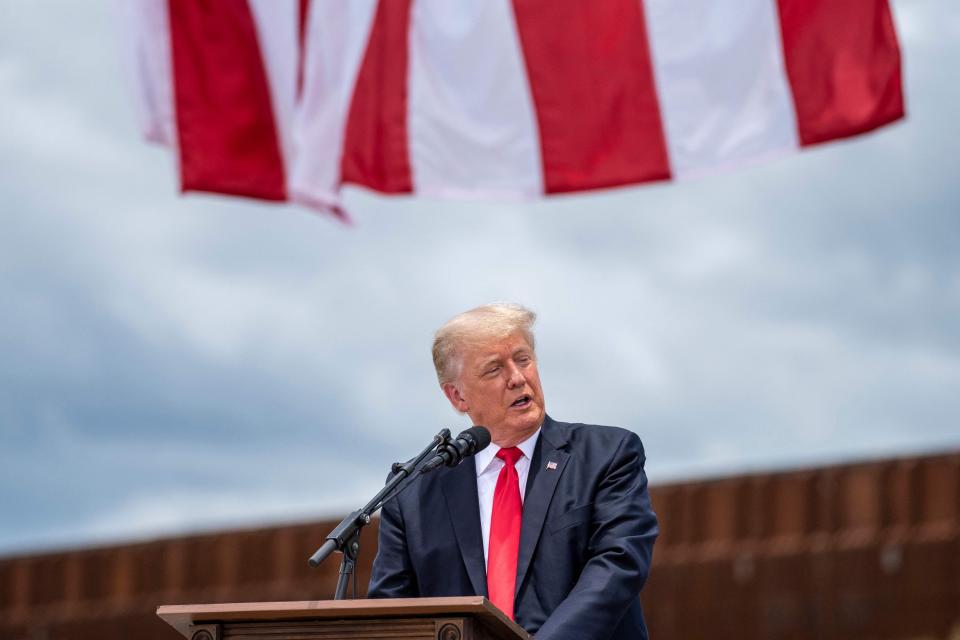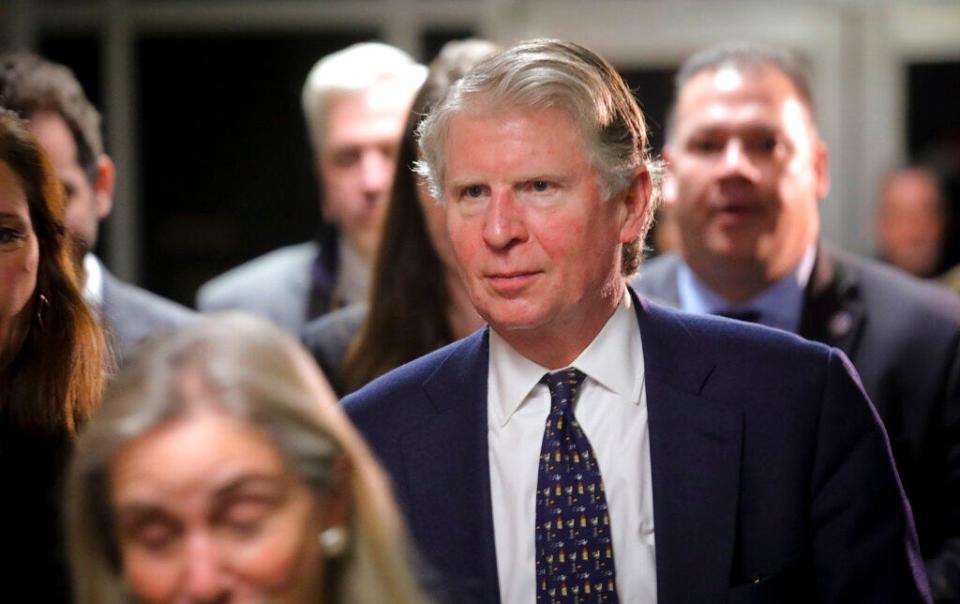Trump Organization charged with tax fraud. For Donald Trump it's more a legal risk than a political one
- Oops!Something went wrong.Please try again later.
- Oops!Something went wrong.Please try again later.
WASHINGTON – As Donald Trump continues to dangle the possibility of a 2024 presidential run – a testament to his iron-clad grip on the Republican Party – his legal future became more uncertain and more complicated Thursday, after prosecutors announced tax fraud charges against his namesake company and a loyal executive.
New York prosecutors accuse the Trump Organization of a years-long tax fraud scheme that paid company executives "off the books," allowing them to avoid paying hundreds of thousands of dollars in state and federal taxes, according to the indictment. Allen Weisselberg, the company's longtime chief financial officer, was the largest beneficiary of the scheme, prosecutors allege, which allowed him to receive about $1.76 million in untaxed income.
The charges, the result of a joint investigation by Manhattan District Attorney Cyrus Vance and New York Attorney General Letitia James, do not directly implicate the former president and do not put him at risk of going to jail.
CFO charged: Trump Organization charged with tax fraud, CFO Allen Weisselberg also charged with grand larceny
What does a CFO do anyway?Weisselberg's indictment puts the spotlight on this key financial rol
But the criminal charges raise questions about what Trump knew and whether he was involved in the long-term scheme allegedly orchestrated by his own company, said Renato Mariotti, a former federal prosecutor in Illinois.
Officials on Thursday also left open the possibility that more people will be charged as the investigation progresses.
"The biggest potential implication is that this is just the beginning of a larger investigation," said Randall Eliason, a former federal prosecutor in Washington, D.C., and an expert on white collar crime, said, adding that charging the Trump Organization and Weisselberg does not prevent prosecutors from going after other people in the company, including Trump. "It's not at all uncommon in big white collar investigations to have some initial indictments followed with more."

Duncan Levin, attorney for Jennifer Weisselberg, Allen Weisselberg's former daughter-in-law who's been cooperating with prosecutors, suggested that the indictments likely represent the beginning of legal actions against Trump's interests and associates.
More: Trump's longtime financial chief, confidant indicted. Who is Allen Weisselberg?
Levin said his client, who has provided at least 10 boxes of documents to prosecutors and has pledged to testify in front of a grand jury or at trial, was present during conversations in which Trump discussed providing fringe benefits, including school tuition and apartment renovations, in lieu of salary for Allen Weisselberg.
Prosecutors have not been able to secure Weisselberg's cooperation to help them go after higher-ranking executives. Faced with criminal charges, Weisselberg now has a motive to cooperate, which could theoretically hurt Trump, said Patrick Cotter, a white collar defense attorney and a former federal prosecutor.
"In that sense, (Trump's) legal position is somewhat more in peril," Cotter said.
But Trump could also emerge unscathed, Cotter cautioned, adding that it's possible he did not have any knowledge of the scheme.
Vance's office has been investigating whether the Trump Organization manipulated property values to obtain favorable loans and reduced tax rates. Investigators also have been looking into hush-money payments made to women who alleged to have had an affair with Trump. James announced in May that her office's parallel civil inquiry had escalated to a criminal probe and that state authorities had joined Vance's investigation.

The district attorney won a major victory earlier this year, after Trump's accounting firm was forced to turn over eight years' worth of Trump's tax records following a protracted legal battle that ended at the Supreme Court. The investigation appeared to have accelerated last month with the disclosure that a special grand jury had been convened to consider possible evidence of criminality by the president, his business associates or the company itself.
Also cooperating with prosecutors is Michael Cohen, Trump's former personal attorney who has acknowledged meeting with investigators multiple times. Cohen pleaded guilty in 2018 to federal charges that included campaign-finance violations for facilitating hush-money payments in Trump's behalf and for lying to Congress.
He said the indictments mark the end of Trump's "political farce, also known as American's political nightmare."
As for Trump's legal liability, Cohen said: "Documents and numbers don't lie – Donald Trump does."
Indictments unlikely to hurt Trump among Republicans
While Trump Organization attorneys grapple with prosecutors in New York, Trump will seek to turn the indictments into a political issue by arguing they are part of a Democratic plot to take down him and his "Make America Great Again" campaign.
The former president has already spent weeks attacking the prosecution and downplaying the allegations against him and his company.
"In New York, radical left prosecutors are right now spending vast amounts of time and money threatening families and trying to destroy the lives of innocent people, really, really good people, in their crusade to inflict pain on me," Trump told supporters during a June 5 speech to the North Carolina Republican Party.

Political analysts said Trump's claims may play with conservatives, and the indictments probably won't hurt him among Republican voters who will decide the party's presidential nominee in 2024.
"Trump has long complained he is being persecuted by Democrats," said Republican commentator Scott Jennings. "For many people who believe this, this (set of indictments) will be a confirming event."
But future revelations in the investigation could well take a political toll on Trump as he considers another presidential run. His efforts to trivialize the charges will fall flat over time among non-ideological voters as they grasp the scope of Trump's efforts to reduce tax bills by millions of dollars, political and legal analysts said.
Norm Eisen, a senior fellow at the Washington, D.C.-based Brookings Institution, said the indictments are not the end or "even the beginning of the end."
"To paraphrase Churchill, it's just the end of the beginning," said Eisen, who co-authored a report about the investigation into Trump's business. "There could well be more charges ahead, including for Trump, that will make the prosecution even harder to spin away with his usual bluster."
During an arraignment Thursday in Manhattan, Assistant District Attorney Carey Dunne pushed back against allegations that prosecutors were motivated by political animosity against Trump.
"Politics has no role in the grand jury chamber, and I can assure your honor that it played no role here," Dunne said.
What about the Trump brand and his company?
It's unclear what this might mean for the Trump Organization and the Trump brand, but in the past, companies have gone out of business after an indictment.
"They could lose investors. It can damage the willingness of parties to lend to them or do business with them. It obviously puts a cloud over the company's head," said Jessica Roth, a former federal prosecutor in Manhattan and a professor at Cardozo School of Law.
It's not at all unusual for prosecutors to go after corporations in addition to executives. Charges usually lead to convictions by guilty pleas, and companies rarely go to trial, experts say.
In deciding whether or not to charge corporations, prosecutors consider a number of factors.
"How pervasive is the wrongdoing within the corporation? How long has it been going on? How serious is it? How high-ranking are the people involved? What's the history of the company? Is there a history of other wrongdoing or criminality? What steps has the company taken to prevent criminality within its ranks? How cooperative was the company with prosecutors? What would be the collateral consequences for innocent parties such as employees?" Roth said.
This does not mean that all of these factors apply to the Trump Organization, Roth said, but it likely means that at least one is present.
During the hearing, Dunne made clear that lack of cooperation from the company was a factor. He said the Trump Organization made no effort to discipline its executives and to report the alleged crimes, and, instead, dragged litigation to the Supreme Court.
"A company has a complete right to adopt this type of combative, uncooperative approach," Dunne said. "But having done so, it doesn't have the right to then turn around and demand the leniency and benefit that flows to a company that does cooperate."
This article originally appeared on USA TODAY: Trump Organization, Weisselberg charged: What's next for Donald Trump?

